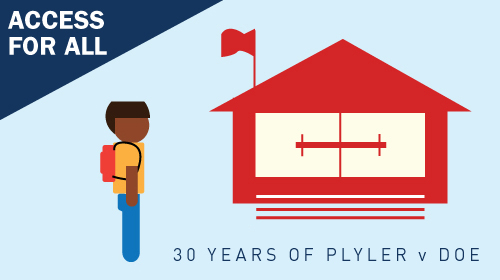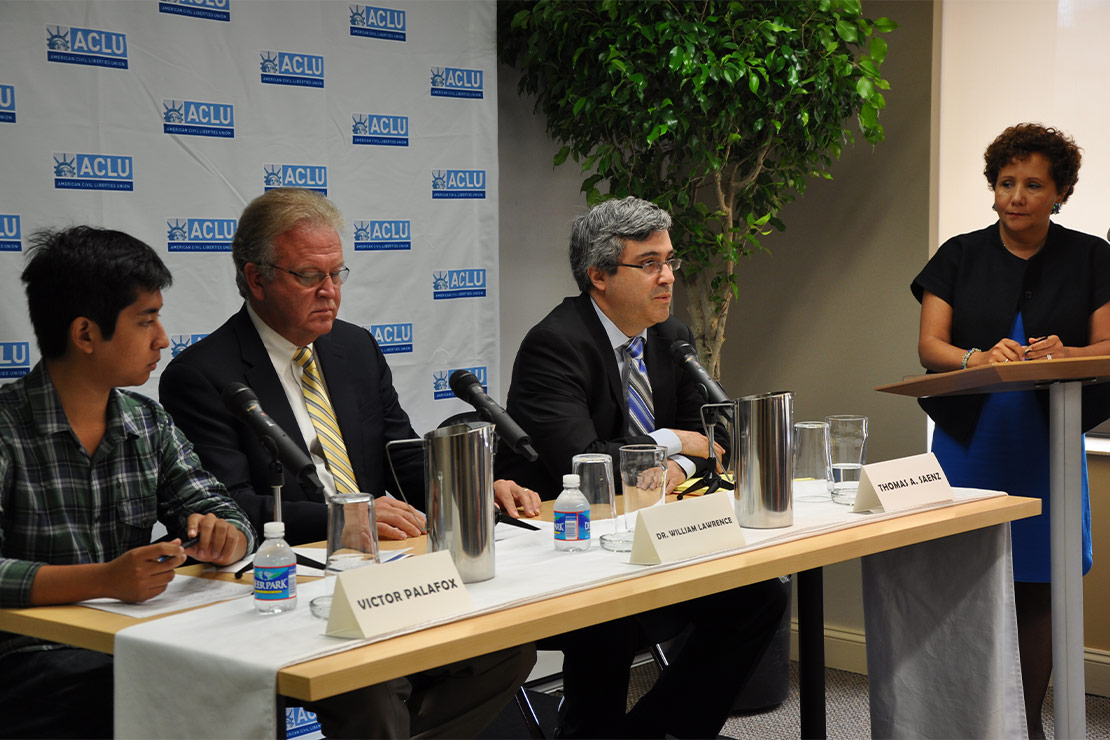Protecting the Promise of Plyler in Alabama and Beyond


“This,” said Assistant Attorney General Tom Perez, “is about real people with real dreams.”
Yesterday, Perez joined the Department of Education’s Assistant Secretary for Civil Rights Russlynn Ali and a distinguished panel at the ACLU’s Washington Legislative Office to commemorate the 30th Anniversary of Plyler v. Doe, the Supreme Court decision that guaranteed equal access to a public education to all children, regardless of citizenship or immigration status. In their remarks, Perez and Ali highlighted the stories of real people: the many children whose access to education—and their dreams—are being threatened as a result of Alabama’s HB 56 and other anti-immigrant state laws.

From left to right: Palafox, Lawrence, Saenz, Murphy
Panelist Victor Palafox, a community organizer who was born in Mexico but has called Alabama home most of his life, understands what these young people are going through. Now 20 years old, Victor said that Plyler gave him an opportunity to study, to learn and to progress, all the way to graduation without having to worry.
“[G]rowing up as undocumented, when you’re in school, you really do feel safe, or so you used to,” Palafox said. “I remember my mother reassuring me that whatever happens outside school is one thing, but when you’re in school it’s a completely different thing.”
But when HB 56 went into effect in Alabama last September, all of that changed. The law mandated that school officials verify the status of students and their parents at the time of enrollment. Victor saw kids driven away from pursuing an education as he had just a few years earlier. Families fled the state in fear, leaving behind the homes, businesses and communities they had spent years establishing. Children were pulled out of school overnight, causing absentee rates among Hispanic students to immediately triple. Many of those that remained came to school in tears, fearful that their parents might be deported at any time. Although the school verification provision of H.B. 56 has since been temporarily blocked in court, irreparable damage had already been done.
Dr. William Lawrence, the principal of Foley Elementary School and a panelist at yesterday’s symposium, was on the ground in Alabama the day that HB 56 went into effect. He recalled drying the tears of children at his school in the immediate aftermath of the law, saying, “We were hired to educate and love children, not to act as immigration officers.”
According to panelist Thomas A. Saenz, president and general counsel of MALDEF, which led the fight in Plyler v. Doe three decades ago and has since continued to defend its principles, school administrators like Dr. Lawrence are all too rare. For the many students who encounter hostility in school because of their immigration status or nationality, Saenz called Plyler a “singularly important precedent.”
In the face of Alabama’s unparalleled attack on children, the two civil rights champions from the Departments of Justice and Education yesterday reaffirmed their agencies’ commitments to enforcing Plyler by ensuring that school districts not only understand their responsibilities to educate all students, but live up to them. Removing barriers to equal access, said Ali, is “the heart of the civil rights movement of today.”
Last year, the agencies issued joint guidance reminding school districts nationwide of their responsibilities under Plyler and federal law to provide equal educational opportunities to all children residing in their districts, regardless of their race, color, national origin, citizenship or immigration status, or that of their parents and guardians. The guidance prohibits schools from using fear and intimidation to discourage students from attending school, as Alabama did by passing H.B. 56. For example, schools may not demand information about a child’s citizenship or immigration status when families try to enroll them, and they may not turn away a student because he or she lacks the paperwork to establish residency, or provides a foreign birth certificate to prove age.
At the symposium, both Perez and Ali called on the nationwide audience to help them continue to learn about instances of discrimination in Alabama and across the country, as they work with individual school districts to guarantee compliance with Plyler.
The Administration’s commitment to keeping the schoolhouse doors open to all children in the U.S. is sending a message to states loud and clear: discrimination is against the law and will not be tolerated. Educating our kids is too important. It was true when Plyler was decided 30 years ago, and it’s just as true today.
As Perez put it, “I took an oath to enforce the Constitution and the law of the United States. Plyler is the law of the land.” And it’s a law that we need to defend now more than ever.
In just a few months, it will be time for kids across the country to step onto a school bus or into a classroom for the very first time. And it is everyone’s responsibility to ensure that they can take that step without fear.
Learn more about immigrants’ rights: Sign up for breaking news alerts, follow us on Twitter, and like us on Facebook.




